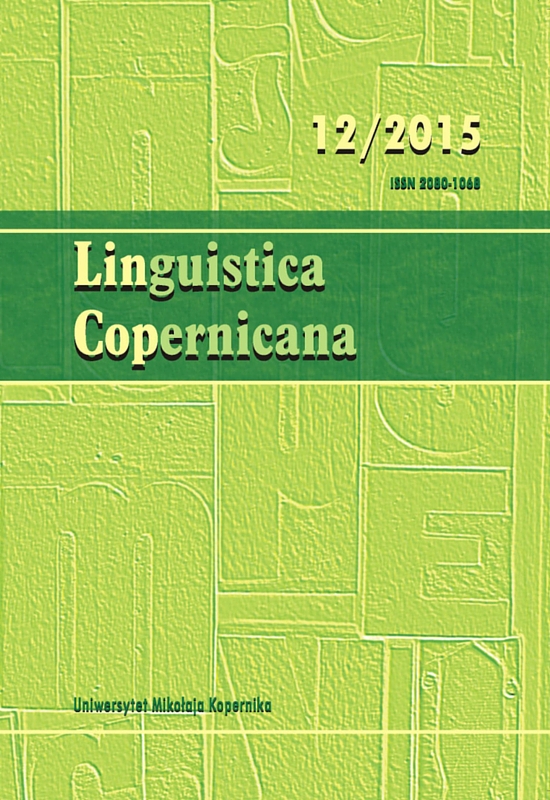Where is the "cel" [purpose] in Sentences with celowo [purposefully] and Several More Questions on the Related Expressions
DOI:
https://doi.org/10.12775/LinCop.2015.001Keywords
bez celu, bezcelowo, bezcelowy, celowo, celowy, niecelowo, niecelowy, on purpose, purpose, purposefully, action, adjective, adverb, intentionality, semanticsAbstract
In the article I discuss selected aspects concerning the semantics of expressions related to the notion of purpose in Polish: celowo [purposefully], celowy [purposeful], niecelowy, bezcelowy [purposeless], niecelowo, bezcelowo, bez celu [purposelessly] (in rough approximation of meaning). My starting point is the question mentioned in the title, i.e. where to “locate” the purpose one has in mind in sentences with celowo [purposefully]: whether it is external to what is indicated by the sentence predicate (ktoś powiedział coś celowo ‘somebody said something purposefully’ → somebody said something [p] in order to achieve something else [q], something other than the mere fact of saying p), or whether we mean the internal purpose, related strictly to the predicate (somebody destroyed something on purpose → somebody wanted to destroy it, destroying it was his purpose here). The ambiguity of sentences with the adverb celowo, as well as the adjective celowy, can be resolved by identifying the type of the verb in the position of sentence predicate. However, this is not a completely reliable test, and one can always come across sentences ambiguous in that matter (cf. celowe działanie → ‘action on purpose’, action having purpose in itself, or ‘purposeful action’, action directed towards some purpose). All the expressions mentioned above are being further analyzed in terms of “purpose localization”.
This kind of distinction is followed by another one, connected with sentence perspective – either objective or subjective. What matters here is whether the speaker has in mind the agent’s purpose (external or internal → subjective perspective), or whether the speaker ignores the subject’s goals and estimates his action from the point of view of some objective aims fixed by the speaker himself, as in sentences: Rząd podejmuje bezcelowe działania [The government undertakes purposeless actions] or Przywrócenie pracownika do pracy byłoby niecelowe [Bringing the employee back to work would be purposeless].
Finally, we have three different “purpose locations” in sentences with the expressions in question, thus, three different “types of purpose”: subjective internal purpose, subjective external purpose and the objective one (the latter being always external to what is indicated by the sentence). Some of the analyzed expressions point to the type of purpose unambiguously (bezcelowo, bezcelowy, bez celu), others are ambiguous, expressing one of the two (celowo, niecelowo) or even three senses (celowy).
References
AUSTIN J., 1977, Jestem niewinny, Znak 29, s. 667–696.
BOGUSŁAWSKI A., 1977, Problem of the Thematic-Rhematic Structure of Sentences, Warszawa: PWN.
BOGUSŁAWSKI A., 1991, Semantic Primes for Agentive Relations, Lingua Posnaniensis XXXII/XXXIII, Poznań, s. 39–64.
BOGUSŁAWSKI A., 1999, Inherently thematic or rhematic units of language, w: E. Hajičova et al. (red.), Travaux du Circle Linguistique de Prague 3, Amsterdam, s. 211–224.
BOGUSŁAWSKI A., 2003, Aspekt i negacja, Warszawa: KLF UW.
BOGUSŁAWSKI A., 2008, Semantyka, pragmatyka. Leksykografa głos demarkacyjny. Warszawa: BEL Studio.
BOGUSŁAWSKI A., 2009, Myśli o gwiazdce i regule, Warszawa: BEL Studio.
DANTO A. C., 1963, What Can We Do, The Journal of Philosophy 60, s. 435–448.
DAVIDSON D., 1966, The Logical Form of Action Sentences, w: N. Rescher (red.), The Logic of Decision and Action, Pittsburgh: University of Pittsburgh Press.
DURAJ-NOWOSIELSKA I., 2007, Robić coś i coś powodować. Opozycja agentywności i kauzatywności w języku polskim. Warszawa: Wydział Polonistyki UW.
DURAJ-NOWOSIELSKA I., 2012, Nie przypadkiem o niechcący. Szkic semantyczny, Warszawa: Wydawnictwo UKSW.
DURAJ-NOWOSIELSKA I., 2013, O teście negacji, kontekstach interpretacyjnych i zdaniach „wyratowanych”, Linguistica Copernicana 2(10), s. 161–191.
[EJP] URBAŃCZYK S., KUCAŁA M. (red.), Encyklopedia Języka Polskiego, 1999, Wrocław–Warszawa–Kraków–Gdańsk: Ossolineum.
FREGE G., 1977, Pisma semantyczne, przeł. B. Wolniewicz, Warszawa: Państwowe Wydawnictwo Naukowe.
GROCHOWSKI M., 1980, Pojęcie celu. Studia semantyczne, Wrocław–Warszawa–Kraków–Gdańsk: Ossolineum.
HAMPSHIRE S., 1959, Thought and Action, London: Chatto & Winds.
KLEMENSIEWICZ Z., 1968, Zarys składni polskiej, Warszawa: Państwowe Wydawnictwo Naukowe.
RYLE G., 2000, Courses of Actions or the Uncatchableness of Mental Acts, w: A. O’Hear (red.), Philosophy – The Journal of the Royal Institute of Philosophy, t. 75/293, s. 331–344.
SACKS O., 1996, Mężczyzna, który pomylił swoją żonę z kapeluszem, Poznań: Zysk i S-ka.
SEARLE J., 1983, Intentionality. An Essay in the Philosophy of Mind, Cambridge–New York: Cambridge University Press.
[SJP] Szymczak M. (red.), Słownik Języka Polskiego, 1992, Warszawa: Państwowe Wydawnictwo Naukowe.
WRÓBEL H., 1999, Czasownik, w: R. Grzegorczykowa, R. Laskowski, H. Wróbel (red.), Gramatyka współczesnego języka polskiego. Morfologia, t. II: Słowotwórstwo, Warszawa: Państwowe Wydawnictwo Naukowe, s. 536–583.
Downloads
Published
How to Cite
Issue
Section
Stats
Number of views and downloads: 929
Number of citations: 0



